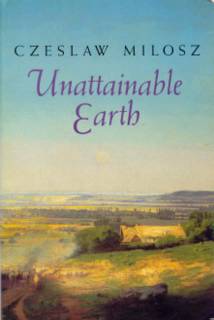
Some day soon I may hear he has died. Czeslaw Milosz, the writer, is seven years short of his century. He was born in 1911 in old Lithuania, then part of tsarist Russia. He will die as a Polish-American poet. That is how the headlines will capture his essence. My guess is that his death will be recorded here in Australia, if only because his name has been yoked with Nobel's since 1980, when he was awarded the literature prize.
Until now, I've always hesitated to write about Milosz. In the first book of his to come my way, I found this quotation from Goethe:
"Whatever one knows, he knows for himself only and he should keep it secret. As soon as he reveals it, contradictions appear, and if he begins to argue, he will lose his equilibrium, while what is best in him will be, if not annihilated, at least shaken."
More, from The Australian newspaper.
Y aquí, algo de Milosz en el castellano.
7 comments:
podria ayudarte de algo ver mi pagina, siempre es bueno ayudar a alguien... ivis
http://ivis33.blogspot.com
Bernardito,
About the quote from Goethe. I was thinking about this the other day: what if most of the great things that have been created, thought or made have never been made known publicly. I would like to think sometimes that there is a secret society whose objective is to keep all the great inventions and works of art private (with the ancillary effect of mainaining the world in a continuous Dark Ages).
For instance, all of Giotto's contemporaries have praised mostly those works of his that no longer exist.
Balzac has written a novella about this called 'Le Chef d'Oeuvre Inconnu' - which was made into a modernized film version in 1991 called 'La Belle Noiseuse'. Here, the artist achieves his crowning glory at the end of his life, which he subsequently bricks into a wall.
Is a work of art less so if nobody else sees it?
I suppose the greatness of works of art is a collective and comparative judgment. Presumably this judgment would be impossible to make if enough works of art were hidden away.
I remember the painter R.B. Kitaj (a very interesting fellow) asking why painters felt the need to exhibit.
I suppose it could just be a matter of semantics.
However, if all those works of art that have been lost or destroyed - and never seen - suddenly showed-up, wouldn't they transform how we see and classify existing works? (Extant) art may be a collective thing, but it is certainly always an incomplete view - and therefore perhaps a misguided evaluation of its worth.
I think art is just luck. And then we rationalize our delight in retrospect.
True. In the final analysis, something grabs us about a work of art --- or it doesn't.
Today I wandered through four or five interconnected galleries in Waterloo. As soon as I put my head in two or three of them I knew I could move on. Nothing grabbed me.
I like that. It sounds like a dream of Napoleon before the decisive battle.
Conocí a un burro en Zafra. Me dijo que era un personaje en una obra artística. El burro andaluz. Pero no sé nada sobre la mula española.
Post a Comment